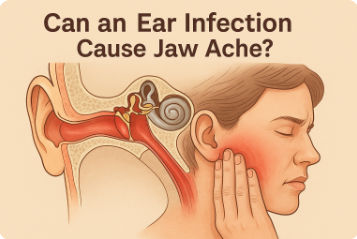Introduction
Many people are surprised to learn that ear infections can cause pain beyond the ear itself. In fact, jaw ache is one of the most commonly reported symptoms associated with ear infections.
This is due to the close relationship between structures in the head and neck region, particularly the ear and the jaw. Understanding how these systems interact can help you get the right treatment and relief.
Anatomy of the Ear and Jaw
To understand how an ear infection can lead to jaw pain, it’s helpful to explore the anatomy involved. The temporomandibular joint (TMJ) is located right next to the ear canal. This joint allows your jaw to move and function properly.
Both the ear and the jaw share nerves like the trigeminal nerve, which is responsible for facial sensations and motor functions. If there’s an issue in one area, like an infection in the ear, the pain can travel along these shared nerve pathways and manifest in the jaw. This is known as “referred pain.”
Types of Ear Infections That May Cause Jaw Ache
1. Otitis Media (Middle Ear Infection)
This occurs when the space behind the eardrum becomes inflamed due to fluid buildup and bacteria. It’s more common in children but can affect adults as well.
2. Otitis Externa (Outer Ear Infection or Swimmer’s Ear)
This is an infection in the outer ear canal, often caused by water getting trapped and fostering bacteria. The inflammation can radiate pain to the jaw.
3. Chronic Ear Infections
These long-term infections can cause ongoing discomfort, including pressure and pain in nearby areas such as the jaw and neck.
4. Eustachian Tube Dysfunction
When the tube that connects the middle ear to the back of the throat doesn’t work properly, it can lead to fluid retention and infections, contributing to jaw pain.
How Can Ear Infection Cause Jaw Ache?
There are several ways ear infections can cause jaw pain:
- Inflammation and Pressure: When an infection occurs, it causes inflammation and swelling in the ear. This swelling can press against the nearby TMJ or muscles, leading to jaw ache.
- Referred Pain: As mentioned earlier, nerves shared by the ear and jaw can transmit pain signals from the ear to the jaw.
- Lymph Node Swelling: Ear infections often cause swelling in the lymph nodes near the jaw, contributing to tenderness or soreness.
Table: Summary of Causes
| Cause of Jaw Pain | Explanation |
|---|---|
| Inflammation | Swelling from infection puts pressure on nearby jaw areas |
| Nerve Referred Pain | Shared nerves carry pain from the ear to the jaw |
| Swollen Lymph Nodes | Inflammation causes nearby lymph nodes to swell, adding to jaw pain |
Symptoms to Watch For
Jaw ache due to an ear infection may not be the only symptom. Look out for these accompanying signs:
- Earache or pressure
- Reduced hearing or muffled sounds
- Swelling near the ear or jaw
- Difficulty chewing or opening the mouth
- Headache or facial pain
- Fever or fatigue
The presence of multiple symptoms makes it more likely that the jaw pain is linked to an ear issue.
Differentiating Between Ear Infection and TMJ Disorders
While both conditions can cause similar pain, there are differences:
Ear Infection Indicators:
- Pain worsens when lying down
- Fever or signs of infection
- Drainage from the ear
TMJ Disorder Indicators:
- Clicking or popping sound when opening the mouth
- Jaw locks in open or closed position
- Pain increases with jaw movement but not necessarily with ear pressure
If you’re unsure, it’s best to consult a medical professional to confirm the diagnosis.
When to Seek Medical Attention
It’s important to not ignore jaw ache that may be tied to an ear infection. Seek medical care if:
- The pain is severe or persistent
- Symptoms last more than a few days
- You experience hearing loss
- There is pus or unusual discharge from the ear
Early treatment can prevent complications and provide faster relief.
Treatment Options
Treating jaw pain from an ear infection usually involves addressing the root cause—the ear infection itself.
Medical Treatments:
- Antibiotics for bacterial infections
- Antifungal drops for fungal infections
- Decongestants or antihistamines for related sinus issues
Home Remedies:
- Warm compress over the affected ear
- Over-the-counter pain relievers like ibuprofen
- Gentle jaw exercises to relieve muscle tension
Professional Help: If symptoms persist, an ENT (Ear, Nose, and Throat) specialist or a dentist experienced in TMJ issues may be needed.
Preventing Ear Infections and Related Jaw Pain
Good hygiene and care can go a long way in preventing infections and associated discomfort:
- Keep ears dry and clean
- Avoid inserting objects into the ear
- Treat allergies and colds promptly
- Practice good oral hygiene
Conclusion
So, can ear infection cause jaw ache? Absolutely. The close proximity and shared nerve pathways between the ear and jaw make it entirely possible. Whether the pain is due to inflammation, pressure, or referred nerve pain, recognizing the symptoms and seeking prompt treatment is key.
Related Articles
The Ultimate Guide to Chewable Cough Medicine for Kids – Safe & Effective Options
Lower Stomach Pain After Coughing: Causes, Treatment, and Prevention Guide
Are Halls Cough Drops Gluten Free? Detailed Guide for Gluten-Sensitive Consumers
Do Cough Drops Have Calories? | Full Guide on Calories in Cough Drops

